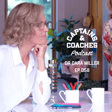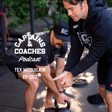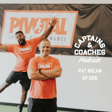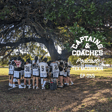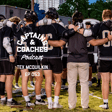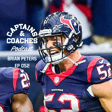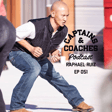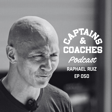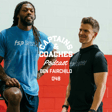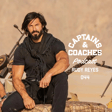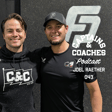Raising the Standard of Average
00:00:00
Speaker
how do I take this elite standard and teach it at a lower level so that even the gen pop, the way we of refer it to is, um want to raise the standard
Introducing Leadership in Athletics
00:00:08
Speaker
of average. Welcome to the Captains and Coaches podcast. We explore the art and science of leadership through the lens of athletics and beyond.
Ben's Resilience and Reinvention
00:00:15
Speaker
I'm your host, Tex McQuilkin, and today's guest embodies resilience in its purest form. We welcome Ben Mayfield Smith, the founder of Matter Athletica. At 21, Ben's professional rugby career in Australia ended instantly when a car accident left him with permanent
From Despair to Purpose
00:00:31
Speaker
From contemplating suicide to completely reinventing himself, Ben discovered that his true calling wasn't just about physical transformation, but unlocking the psychological barriers that limit human achievement.
00:00:45
Speaker
In this powerful episode, Ben reveals his framework for helping clients envision their five-year potential. He breaks it down into actionable processes that create immediate momentum.
True Desires vs. Expectations
00:00:58
Speaker
You'll discover why most people set goals that others want for them rather than what truly drives their deepest ambitions. Get ready to challenge your perception of what's possible as we explore how tragedy can become the ultimate catalyst for discovering your authentic purpose.
Humorous Australian Stereotypes
00:01:16
Speaker
Let's listen in as Ben helps us raise the game.
00:01:19
Speaker
Ready, ready, and brave.
00:01:25
Speaker
We're kicking this off. I've seen Dumb and Dumber a thousand times. And one of my just kickers is when, I mean, it's right in the intro, when he pulls up in the limousine and that beautiful woman's at the he a bus stop and he's like, it's a lovely accent you have.
00:01:45
Speaker
She says ah Austrian. He's like, oh, let's put another strip on the body. Ha ha ha. Oh, so so that yeah, it just clicked to me that Bobby is barbecue, right?
00:02:02
Speaker
Yes. Yes, it is. Yeah. That's how we, that's a summer Bobby is what we do. However, to clarify, when we come over there, no one throws a shrimp on the Bobby.
00:02:14
Speaker
I don't know how Paul Hogan came up with that catchphrase. I don't know how that became an advertising slogan in the, in the eighties. No one puts a shrimp on the barbecue. Oh, that wasn't Dumb and Dumber. So Dumb and Dumber was referencing Hogan. Yeah, yeah you know you Paul Hogan from Crocodile Dundee?
00:02:33
Speaker
I know what Crocodile Dundee is. I just haven't seen it. So the actor Paul Hogan ran this ah tourism ad for Australia and basically was like, come down under, we'll throw a shrimp on the barbie.
00:02:44
Speaker
And no one ever has ever done that. And it was this big Australian advertising campaign for the ah during the 80s. And that was pretty much how everyone grew to reference Australia forever, top of the whole time.
00:02:57
Speaker
Wow. We learn new things every day. This is amazing. now We have got a three and got a random Starbucks attendee, clerk, server, whatever you want to call it.
00:03:08
Speaker
And we're in the middle of Reston, Virginia, is just going for a walk to get a coffee. And this guy's like, heard my partner speak, and he's like, that accent, I know it.
00:03:20
Speaker
He's like, Australian, crocodile Dundee, shrimp on the barbie. And we're just like... We've done so many cool things from Australia and that's all you've got from 40 years ago now. All right. that's that's That's all we're known for now.
00:03:34
Speaker
i mean, what else is cool? but That's it. unless we We throw shrimp on the barbie. That's our thing. And really bad breakdancing. Oh, my goodness gracious. god What a...
00:03:48
Speaker
Nightmare. That woman, I mean, is she did she just pack up her things and just leave the country or what? ah No, she actually she she stood her ground and basically offered $10,000 to anyone to come verse her and beat her breakdancing.
00:04:04
Speaker
So she she stood on her business that she was an Olympic breakdancer and was like, you know what? you can do it better than I'll give you $10,000, come verse me. And everyone was just like, please sit down. We're done with you. would tell So she lost the $10,000. I just you were thinking about both of the 10 up.
00:04:23
Speaker
Wow. Even more embarrassing. but I was like, this is not even worth my time. Yeah. When you started to see her become a Halloween costume.
The Life-Changing Car Accident
00:04:33
Speaker
Oh, yeah. mean Global icon.
00:04:37
Speaker
and We don't get done with any good things. but Man. Unfortunately... That sport is not in the 2028 Olympics.
00:04:49
Speaker
I'm not saying it's got everything to do with her, but I'm saying there's a lot to do with her. When I'm reading it, you're going to breakdance in Olympics. Yeah.
00:04:59
Speaker
I mean, she'll she'll go down in history 100 years from now. They'll be like, hey, I got a good sport idea. And go back. um Didn't they try that once?
00:05:12
Speaker
but yeah Well, after 100 years, lacrosse is back in 2028. So i'm I'm a happy camper. um And rugby's been back since 2016. It's the It's pretty fast.
00:05:27
Speaker
So now i I feel this is a good segue. what we call it in the the podcasting show biz into your journey, Ben. So you started as that rugby athlete as a young man, and you had an opportunity in front of you until done dun, dun, dun.
00:05:46
Speaker
So speak to us on that that moment where you're seeing a vision for yourself and then tragedy strikes.
00:05:59
Speaker
Let's do it. So, you know, I've told this story many times and every time it still gets like, it gets goosebumps. Like I still, it feels like it's a whole different life to me now from what I what i live now where I am, you know, ah chasing 12 years since the incident, but there was this whole life before that. with My entire
Overcoming Depression and Finding Purpose
00:06:18
Speaker
life was predicated on playing rugby league.
00:06:20
Speaker
That was my dream, my passion. I mean, we have ah player profiles that mum, we used to have team managers play our coaching our club teams. Mum was our team manager. We had these player profiles. We were like six years old.
00:06:33
Speaker
You know, what do you want to be when you grow up? What's your favorite color? What's your favorite team? Who do you follow in the NRL? That was our professional code here. And, you kids are riding carpenter, truck driver, you know, doctor.
00:06:45
Speaker
And I was like, I'm playing rep football for this club, for this team. I'm doing this. I was a six years old. The bar was like this high. It was no like, um I'll have some fun and I'll do something. This was what I wanted to do and what i was going to do.
00:06:57
Speaker
And yeah that my entire life was basically predicated on playing the sport. And yeah I'm not to say that I was going to go to that pro level. like it's It's a very different route here in Australia. It's how you kind of go pro than then yeah d one in college and and getting drafted things like that.
00:07:11
Speaker
So I was not to say that I was guaranteed to go to that spot, but in my head, like there was everything up until I'm 30 because 30 is the average eight average age of rugby league, and then that's where it ended afterwards. And i was that was my thing.
00:07:23
Speaker
I moved towns to play it. You know, i've changed area codes to play it. I moved my entire life to play it, changed contracts for it, had different levels of opportunities in high school for it, where, you know, I i was part of a state championship team here in Australia for it high school. So, you know, we I got to play some very exciting levels. it It took us around the country. I did some great things with it.
00:07:44
Speaker
And my entire life was basically play the sport and do my job to sustain that sport. So, know, to try and make it here in Australia, It's not like you go through the college route. you know A lot of the time that to make it at the NRL level, the rugby league level, it's playing at club level, weekend sport, at a high level, getting contracts and basically working with the grades.
00:08:06
Speaker
And then you try to get selected from those games from those teams to go play at the professional level. And so I was basically working a full-time job as an apprentice carpenter so that I could sustain paying my way through playing this sport.
00:08:18
Speaker
So my entire life was basically this sport, everything else to sustain that. And unfortunately, at 2021, I was making my way through the ranks of a ah new town inside this new club, this new team.
00:08:32
Speaker
and The year before, we just won a grand final. ah Sorry, we just i mean just lost the grand final, but we were in it. We're part of the championship like opportunity team. um Worked up to the next grade the following year.
00:08:44
Speaker
I'm getting opportunities here to trial for the next grade. So I kind of go from like a like talk towards like a D1 team kind of thing. And at 21, was on the way to work work one morning I was hit by car.
00:08:58
Speaker
And that was like... Pretty much in the span of five years, everything that could possibly go wrong basically went wrong. And it
Adversity and True Values
00:09:07
Speaker
was one of the most depressive, humbling, but also, like if I were to look back at it, ah grateful periods of my life because it literally, it changed and challenged everything, but it gave me opportunities to really see who I am.
00:09:29
Speaker
yeah know I went through, so like I know for a fact, I still have the memories. I know the the exact bridge. I have no qualms saying and I don't get shy about it don't shy away from it. I know exactly the bridge that I would drive past because my parents lived a certain way away from me. lived in a new town.
00:09:45
Speaker
I would drive home every once in a while to see them. had a partner in this new town, so I'd go use it on the weekends. And the damage that was done to my back, the pain that was done to my back of my life,
00:09:56
Speaker
I technically have a 10% spinal impairment of my lumbar spine. So like the there's permanent experiences there. It feels like it's a new life. I still go through moments where I'm like, oh no, that was still a part of who I am That still happened. I still have that with me.
00:10:11
Speaker
And I remember the pain was so bad. The the experience was so bad. The the the failure, the hopelessness, that was basically like, you are not going to get any better. This isn't going to improve.
00:10:22
Speaker
You can't do your job anymore. The career was over. There is there is no playing rugby league again. that's like The insurances and the risks to injury ratio is too high. like You are not going to be able to get a contract here.
00:10:33
Speaker
So basically everything that I knew about who I was, what I did, and who I am as a person just got stripped away in the space of five seconds
Sports and Character Building
00:10:40
Speaker
because someone couldn't wait red light. And that was pretty much the day where everything just like topsy-turvy.
00:10:45
Speaker
um and And it really... The exciting part is I would say I'm who I am now because of it, but I think the best part about is that it revealed whoever it was. And that's, I think, part of the story that makes me most proud to tell it is that though I was depressed, I was suicidal, i was you know I had the plans in place, I had the locations in place, I knew what like i knew what I would have done if I hadn't done it.
00:11:09
Speaker
it showed me more of who I was to overcome that, not let that win. And so that was, you know, that was 12 years ago now, but yeah, it's still definitely, definitely something that I can pull from, pluck from memory clear as day.
00:11:21
Speaker
And it was a big part of just changing the course of my life.
00:11:26
Speaker
Yeah. That reminds me of quote John Wooten, very, very famous coach here in the United States ah from college basketball level. And he said, sports don't teach character, they reveal it.
Passion for Education and Fitness
00:11:41
Speaker
So this was an instance for you where, right, most people use an injury as, all right, this is a a character building moment. Well, you had years through athletics, through family and life to build that character that then prepared you for this moment and and reveal it to yourself.
00:12:00
Speaker
Yeah, you're 100% right. I think – sorry, go. yeah i was i going to now lean into the like the education, so your your next phase of your personal professional development.
00:12:15
Speaker
and When did you start to now lean into education? Did you see this as an outlet, or were you always a lifelong learner?
00:12:25
Speaker
I wasn't. interesting type of learner like i wasn't the best structural learner in a school setting um you know it was very similar here you know we played rugby we played sport in school we played rugby league in school so we had programs that would pluck us from class to go to games and matches and we'd have to travel the country that sort of thing so yeah it's very similar to american high school you you guys that the the teams are often hey go play sport first, come back and do your schooling.
00:12:52
Speaker
um But when I found the passions of stuff that I was interested in, I would hyper fixate. um So I was always kind of an avid learner of things that were definitely passionate to me. the The exciting part to me was that the injury forced me to have to find something new.
00:13:09
Speaker
And it was, I can't do this thing. What's the next thing that I love to do? And the one thing that love doing was training. I love training. i love getting better. love trying to build my physique. I was always passionate about Arnie as much as was always pat passionate about my sporting heroes and the people who played our sport.
00:13:25
Speaker
I was also passionate about, know, Arnie's physique was was something else to me, watching Commando growing up, watching yeah the the Total Recalls and watching the you know ah Kindergarten Cop. And you're watching you know all these movies, the Terminators, like Conan.
00:13:39
Speaker
You're watching these movies with Arnie, just like, this is ah peak male. And so for me, it was always like training for
Coaching with Personal Experience
00:13:47
Speaker
that. was also part of training for my sport. um He's the real Arnie.
00:13:53
Speaker
He's a real Austrian. That's an Austrian over there, right there. and and And for me, that was yeah that was the thing. I was like part of it because at the same time, to kind of give a bit more context to the story, is my father was also diagnosed with terminal cancer.
00:14:07
Speaker
And during my car accident, because my parents couldn't afford for for what was called like in-home care, it was either you basically pay paid for blue care, which is like a nurse comes and lives with you through all the all the treatment and stuff like that,
00:14:20
Speaker
because I had to go through legal cases, I couldn't work, I couldn't move properly, I couldn't do a lot around the house. i was like, I'll keep an eye on him. And as I get better, I'll help him get better. And that was basically what was available to us.
00:14:33
Speaker
And it was like, how i have to i move my life to help him out. And that was for the better part of two and a half years. And inside that I was like, you know, we spent a lot of time the gym, doing rehab, making sure he's trying to stay on his nutrition.
00:14:47
Speaker
Little things like just to give listeners an example, with the type of stem cell radiation treatment that he did, he had a platelet count of zero. So that means if he basically nicked himself in the yard work, mowing the lawn, cutting the grass, weeding the flowers, it just would not stop bleeding. He would literally bleed to death unless unless we got him stitched up.
00:15:06
Speaker
So part of my job was basically just to take any physical labor out of his life because he he would die. And that was basically where even though I was in pain, it was like a is like ah your pain not as important as his right now?
00:15:20
Speaker
Because mine is painful, his will die. And so that's where, you know, you're kind of going down the road of seeing, helping someone, working with someone and seeing them get better. i was like, oh, that's good. I like this. This is this is rewarding. it It's good to see.
00:15:37
Speaker
um And so for me, that was that was kind of like a step there where I realized, i' like if I can't do this sport, if I can't do this thing, I need to educate myself. I need something new. I can't do physical labor anymore. i can't do my trade craft.
00:15:50
Speaker
Then working with people, helping people, that's that that's the next thing for me that is that is on the bucket list or down the list, if you will. And to be honest, it's kind of like The Rock says, which is like you know the the best thing that never happened to him was going to the NFL.
00:16:04
Speaker
For me, it's probably that same story. I would have kept pushinging wouldve kept pursuing that same story, trying to get it, trying to make it. but I wouldn't have really tapped into what I love doing, which I'm doing now.
00:16:18
Speaker
And so, yeah, part of me is actually grateful for the incident because it led me down to educate and change lives. It led me down to able to coach people at a different level and work with people that the life level that that I get to do now that's, you flown us around the world to meet you guys, present on stages, offer these perspectives that change the way people view their physical and health and performance, their psychology, their and mental belief,
00:16:41
Speaker
That's like, it's, it's a, almost a gratitude that I have for a very horrible experience that led me to, ah the education, learning, finding this passion what I really
Impact of Elite Standards
00:16:54
Speaker
want to do. That's, that's, yeah. Yeah.
00:16:57
Speaker
Yeah. And then that you weren't just looking at the training. A lot of coaches that find fitness, strength training, coaching for the first time, they're so focused on the program.
00:17:09
Speaker
And you made a decision, deep dive behavioral science, clinical psychology. which makes you a very unique coach in the aspect where that's not the norm, even even here in the United States.
00:17:23
Speaker
So now what drew you to to deep dive and think about the whole athlete and ah versus just, hey, follow this program because it works for me? Yeah, it's a really interesting take when you When you think about it, you're completely right.
00:17:41
Speaker
Time out. Every so often I receive messages that remind me why we created the Old Bull program. Today I want to share Kevin's story with you. Not just because it showcases physical transformation, but because it represents what's possible when training evolves beyond just sets and reps.
00:17:59
Speaker
Kevin recently reached out with a message that captures the essence of what we're building. Here we go. Hey Tex, this is Kevin from Old Bowl. Just wanted to shoot you a quick text to say I'm really digging the program and seeing great results.
00:18:12
Speaker
Made a few dietary tweaks, up my protein for one, but through the training I've been seeing more muscle and strength gain with infinitely less pain in the process.
00:18:23
Speaker
than probably any other point in my lifting career. I recently got together with some friends I hadn't seen in a couple years and every one of them made a comment about how they've never seen me looking bigger or stronger than I do now.
00:18:37
Speaker
Appreciate the program and what you're doing to make it excellent. Here's what really matters. This isn't about quick fixes or unsustainable programs. Old Bull engineered for the experienced lifter who values longevity as much as they do intensity.
00:18:53
Speaker
we're talking about intelligent progression that respects your body signal while constantly pushing your boundaries. If you're ready to transform your training into something more sustainable, more intelligent, and ultimately more impactful, the Old Bull program is your path forward.
00:19:10
Speaker
Click the link in the show notes and take control of your strength journey today. It's not very common ah to see people dive into the psyche of an individual when working with programming, nutrition, and training, right? It's it's not a very common belief to to go, well, the training's in play, the nutrition's in play, it must be the client's fault.
00:19:29
Speaker
And the the interesting part to me was I was always, always passionate about elite athletes, elite individuals, high-performing people. Because really if we look at the top 1%, if we look at the guys that are the 1% of the 1% inside any sport,
00:19:48
Speaker
Most people at the elite level all have similar skillsets, right? Like at the fundamental level, doesn't matter if you're Kobe, LeBron, Derek, doesn't matter who you are, Dwayne Wade. You know how to dribble a ball. You know how to pass. know how to screen. you know how to run plays, right? The the basics and fundamentals are there.
00:20:05
Speaker
So what makes these guys that next level person, right? It can't just be that they're genetically better because psychologically genetics doesn't play that role the way that it doesn't say your muscle insertions and originate destruction, your shape.
00:20:19
Speaker
It just doesn't work that same way. And so I was less concerned about the individual's behavior and say the gen pop level. And I'm a big believer in rather than us lowering the standards to the person, I want to take the person and teach them the standards to live up to high performance.
00:20:36
Speaker
And that's where i I see sport being so powerful. It's like you don't, as as the caption on our website says, like you don't need to want to be Michael Jordan. You don't need to to be the best NBA player in the world. But if we can take a glimpse of what they have to offer,
00:20:49
Speaker
How can I take that and turn your life around and make you a little bit better? How can I elevate you to be a little bit closer, right? When we look at these elite athletes, we put them on this pedestal of untouchable. And to me, it's a fallacy. It's lie because they started somewhere too. They started somewhere realistic.
00:21:06
Speaker
Now, to me, the the pursuit is shoot for the moon, land in the stars. How do I get you, even if we're not going to that elite level, how can I make you just a little bit better in life and then see your life grow with it?
00:21:18
Speaker
And every single person that we've worked with in that regard has unquestionably improved their life. And it's usually towards the craft, like nowadays is body composition coaching, is performance coaching, young athletes, middle-aged athletes, new bodybuilders, things like that. But even the ones who aren't quite chasing that yet just simply want to improve their life, their physical health, and mental health.
Realizing Potential and Overcoming Beliefs
00:21:40
Speaker
But in trying to improve these skills and these kind of beliefs in themselves that, hey, you know what? Michael Jordan isn't so far away. But in doing so, how can we make you just a little bit better? Yeah, he's a you know one of one of one.
00:21:53
Speaker
But what are the things that he did that you can kind of take and implement that will make you a little bit better? That next one up. And so that's that's really where yeah know that that that interest peaked for me.
00:22:06
Speaker
was like, it's not training nutrition. Excuse me, sorry, I'm little bit sick. it's It's not training nutrition because everyone knows training nutrition. Everyone has training nutrition available to them.
00:22:16
Speaker
The information is there. What are we lacking? what are we missing? Well, what did not everyone get access to in school? What did not everyone get access to in adolescence, in early ages? Sport, performance.
00:22:27
Speaker
Not everyone's exposed that competitive drive to know like what it is you're trying to achieve, to have an end goal, to work towards outcomes. There's people, as Cab says all the time, there's people who will never experience a championship team.
00:22:38
Speaker
They'll never experience a grand final position or a trophy. And there's certain skills or certain abilities that come from playing that, from being in that area that they otherwise wouldn't learn.
00:22:49
Speaker
And so that's where I was like, how do I how do i take this elite standard and teach it at a lower level so that even the gen pop, the way we kind refer it to is, I'm going to raise the standard of average.
00:23:01
Speaker
Mm-hmm. Yeah, and I've heard you emphasize potential is perspective limited by how we view the world. And this is starting to really paint that picture for our audience here.
00:23:13
Speaker
So now, how do you introduce potential to a client? We're dealing with a lot of past behaviors or ah beliefs that are self-limiting that have been instilled by other other coaches or family or just society within them.
00:23:30
Speaker
So how do you now start to get them to aim up towards the stars? What's an example of some conversation to help discover and turn their perspective around? So one of the one of the really powerful things, almost a trend you could call it that I've noticed in interviewing, in in goal setting, in consultations, a lot of people initially come to you with a goal they think that everyone else wants them to have.
00:23:57
Speaker
That's the part that's most exciting to me is when I get to these conversations, I'm finding that people will come and say, you know, i want to drop 10 pounds or I want to do i want to do this or I want to you know look a certain level body fat or I want to lift a certain number.
00:24:09
Speaker
so Okay, cool. Why is that? What does that get you? Oh, don't know. It's just when I used to feel this way or I used to be yada yada. It's always a drowned out kind of low intensity, low mood goal.
00:24:21
Speaker
And we kind of looked at this as a lot of people are absent of purpose in life. They don't actually know what they're here for, or what they're working towards. And so one of the things that we've really emphasized in our process of onboarding and working people is rather than looking at what you want to do in the next six months, three months, because, you know, most people even – at a new year's resolution level, right? Everyone's talking about the next four weeks, the next eight weeks. i want to do this this year in the first quarter. It's such a narrow-minded, short-sighted view of what life has to offer.
00:24:55
Speaker
And one of the things we do is some emotional and some visual mapping exercises, and we push them to perceive what five years looks like. And psychology, we call this emotional contrasting.
00:25:08
Speaker
I hit them with a few questions and really extrapolate some thoughts. but it's both positive and negative, and see if that can evoke from them something that they didn't believe that they wanted or something they thought they could never have.
00:25:21
Speaker
So an example of this is just very simple is what does five years look like for you if everything goes wrong in your life as in hell? Now, that sounds really existential. It sounds morbid. It's a very intense thought process, but there's a reason.
00:25:38
Speaker
There's research that proves when we have fear behind us paired with a motivation or a pull in front of us, it's a greater driver because we, in the essence of asking that question, we know where we don't want to be and we know where we want to go.
00:25:54
Speaker
So every decision that we make starts to be with that in mind. So when we're evoking this thought, what does life look like for me? Absolute hell. And usually if I'm working with a father or a family man or if I'm working with yeah someone of that nature, a wife, it's,
00:26:08
Speaker
I've lost my family. My kids hate me. I'm a poor representation of family values. i I'm not living up to the standards I want to raise my kids by. you know For athletes, you know I've given up my passion for the sport. ah I've lost this or I'm not doing these things anymore. I'm no longer fit and healthy. i' I've lost the dream.
00:26:26
Speaker
It's like, okay, fantastic. From this, we have a realization here that that there is a really bad alternative to the life we're trying to build. So now every decision we make at the bare minimum is working away from that.
00:26:40
Speaker
And what's the opposite of absolute negativity? It's potential. There is potential in that. There is potential into where that goes. And so the next question is, okay, People really struggle. like If you ask someone to visualize 1,000 people or 10,000 people, it's really hard for them to tell the difference in number.
00:26:56
Speaker
If you ask people to visualize what can happen in five years or 10 years, it's really hard to visualize. So we start with that that contrast or we start with the negative. Now, said, okay, if you know where you don't want to go in five years, what is what is heaven look like for you? If you were to reach paradise and you're like, I'm on um an absolute i'm um i'm in peace right now.
00:27:12
Speaker
Life is everything I want it to be. yeah you can use You can use religious moral moral equal ah equations here. You can use just moral language. it doesn't matter how you want a word What does perfection look like to you in five years' time?
00:27:26
Speaker
Now, everyone here, this is where I hit them with the don't be timid. Don't be shy. Don't be humble. I want to know what the absolute perfect life looks like for you in five years' time because that's when you start to get real goals and thoughts that people have never allowed to say.
00:27:41
Speaker
It's always like, you know, want have the house and a kid and a car. want to lose 10 pounds. i feel better in my wedding dress. Like, that's great. But between those two questions, we've got a really morbid answer here. We've got a really...
00:27:53
Speaker
Very fearful answer. But ah the opposite side of that is we have a very constructive, positive, directional answer that we're now going to tailor everything to.
Physical Transformation and Life Improvement
00:28:02
Speaker
And the potential you hear in people and they start to recognize that, oh, I've never thought this question before. I've never been asked this question before.
00:28:10
Speaker
And that question starts to paint a picture in their head that they can actually have something they've never thought about. Or they can have something they've thought about and never believe was theirs. And that's where something like physique transformation becomes so powerful to me because every single time we've used that as a vessel, a vehicle to transform someone's life, it's not just the physical that starts to improve.
00:28:32
Speaker
The potential in their physique development usually correlates in cross-transfers to the fields of their life, their personal life, their business, their career. And all of a sudden this potential opens up and then like, oh I've done this. I can now do this.
00:28:45
Speaker
I've done this. I can do this. Oh, I didn't believe I could drop 40 pounds or I could put on 20 kilos of muscle or get on a bodybuilding stage. What else can I do? Well, that was step one. Now let's change directions. Let's find out. Let's see how far we can push this.
00:28:59
Speaker
And that's where those questions really start to evoke some emotions and connections and drive and belief that they can do something they've never done. And that's where like I really find like, pushing potential is so much more important than people think, rather than just playing it safe.
Long-term Plans and Incremental Progress
00:29:14
Speaker
Yeah, love I love it. a lot A lot to build off of that. So I did get my master's in in health behavior change. So there's a lot of lot of different models that we yeah we studied.
00:29:26
Speaker
And the models for me helped me see long term in terms of of behavior, in terms of development, where the schooling was in like smoking cigarettes and you know don't litter.
00:29:41
Speaker
Like, yeah. Okay. Now I was, you know, coaching athletes, college, college coaching grad school. So then I was able to just spin it. Okay. Well, how do I gain, gain buy-in from these, uh, college boys who were my former teammates.
00:29:56
Speaker
And I understand exactly where they are right now, uh, with, you know, $2 Tuesdays when we got a Wednesday practice deal. So, uh, that That helped me see this long-term vision. i love the the the approach where we're we were reaching and then then five years.
00:30:16
Speaker
That's time that... that Yeah, a lot of the population I'm working with, they they can't even see past five months. the Recently, ah we had our lacrosse training camp for a season. It was like an overnight stay camp, you know sleeping bags, cabins, all the fun stuff, and then a lot of practice and team building exercise. So I was in charge all the team building.
00:30:43
Speaker
And I had never been to this this property before. it was It was beautiful, but the weather was not. And on property, there was this, there was this um I'm not going to call it a lake. I'm not going to call it a pond. I'm going to call it a watering hole, if you will. so i' getting In Texas, we have these things called blue holes. It's like this specific algae that grows in this perfect belt around the world that Texas lies on.
00:31:12
Speaker
And it's this bright, beautiful, royal blue watering hole. And it's on the property. It's like two miles. So we just do like fitness trek out there.
00:31:23
Speaker
And then we we run to it and we're at water level. And I had them visualize, okay, what's your what's your goal? What do you want to accomplish? This is varsity and JV. It's freshman to senior.
00:31:37
Speaker
What do you want to accomplish this season? Let's take two minutes, no technology, like focus for two minutes and And then as we're ah thinking about it, I see these this group of men, they were bird watching or something. I don't know what they were doing on the camp.
00:31:52
Speaker
And they're up on the on the top, like the top of the rocks, way, way above us, like 30 feet. The only way up there ah was a different path.
00:32:03
Speaker
So then was like, man, that'd be cool for us to get up there. So we start trekking and running back. And then by then the old men have, are coming down the trail. And so I asked him like, Hey, what, how do we get up there?
00:32:17
Speaker
And, And I take these boys off course. We get up there and wasn't planned, but I'm thinking like, all right, these guys don't care about looking at cool nature stuff yet.
00:32:29
Speaker
Hopefully this makes a memory. So what are we going to do up here? And I thought of the movie dead poet society. i don't know if you've seen it, Robin Williams. There's a scene where he gets them to just stand up on their desk.
Setbacks and Supportive Coaching
00:32:43
Speaker
So these students are like private school kids, okay, let's do something crazy. Let's stand on our desk. And they're all scared. And then Robin Williams' point is like, we're changing perspective.
00:32:56
Speaker
So now I'm thinking like, okay, we just changed perspective. And I did similar to what you stated here. I asked him, it's the end of the season. We're looking down. We're looking back at the start of the year where we are where we were.
00:33:12
Speaker
Now think of your goals. And I had them state there their biggest fear. Like, what are what are you scared about this season? And then from there, I had them like think up that fear and then pick up a rock.
00:33:25
Speaker
So I grab a rock. And then one by one had them share their their fear, what was really ah weighing them down, right? So injuries.
00:33:37
Speaker
And it was surprisingly like they didn't know if they were going to care in four months, you know? And I was like, what? That's just not who I am. So then after they, you know, they got vulnerable, they shared it, they had them throw they're their rock into the into the water, the blue hole. So It's like a representation of like, let's get this weight off your shoulders.
00:34:00
Speaker
andt You're not going to get hurt. I'm going to take care of you. That's why we we do the warmups and the movement prep and all the stuff we do. Not caring, that's on you. Now this is a decision.
00:34:11
Speaker
Like even if we lose one game, the season's not over. Like we can still make a big run for ah state championship. So helping, helping shape perspective, like it's okay to stumble, but certain things are in your control and the rest of it, like coaches, we got your back.
00:34:29
Speaker
Um, so that, that that's in line with what you're thinking. I need to think bigger. I'm limiting them by not thinking five years. Right. Um, So that speak to us on the importance of having a long-term plan with your clients because they're they're investing their time. They know they need something.
00:34:50
Speaker
Now we we take them, we uncover a goal, but now it's little behaviors for a long-term plan. How do you coach? How do you walk through them through that? Because I mean, a lot of the stuff you do is not in person.
00:35:04
Speaker
So they're responsible for their success. Absolutely. You are absolutely correct. it's It's not in person. It's a lot more online. It's a very different approach nowadays to how coaching used to be.
00:35:16
Speaker
um But the exciting part is that the behavioral stuff, the mental stuff, it becomes easy to communicate once you start to understand your people, right?
00:35:27
Speaker
um For us, it's it's once we break that down, right, a big part of even from that five-year topic, right, something that I would i would point to for your young lads is – have them establish what their values are and what their priorities are in life. Alongside that five-year goal, alongside that two-year goal, alongside the 12-month goal, we deconstruct, we do a lot of decompartmentalization inside the goal. We're basically deconstructing the process and kind of bringing it down to bite-sized pieces or incremental checkpoints.
00:35:58
Speaker
But with that, the big thing is like figuring out someone's individual goals to have that emotional buy-in to the outcome and having their priority. So, Everyone's priority in a team might not be they want to go pro. They want to go to college. They might not want to go D1 and play lacrosse at a D1 school.
00:36:14
Speaker
They might just be like, i want to be the first person to graduate high school. And then if if if college comes, D3, D4, D2, that's cool. That's that's awesome. But that's the that's the part we have to connect and understand with our clients. Like, what are your priorities?
00:36:27
Speaker
yeah For me, it's it's providing education. It's uplifting people. It's taking them to the next level, showing the potential in life that they have. With some of my clients, it might be their family, their friends. It might be their physical health more so represents their ability to live life longer and be around to help people.
00:36:43
Speaker
so There's many different reasons why their goals matter. What you do once you have those values and priorities is get an emotional connection from your clients. you get an emotional investment. You get an anchoring point to why they're doing the thing they're doing.
Actionable Steps for Long-term Goals
00:36:57
Speaker
Because a lot of the time, it's like they're not certain why it's happening. They just feel a certain way. And so our job is to anchor them to that so that there's an emotional fallback point. Now, every time a client stumbles or falls, hey, I want you to go review your values.
00:37:12
Speaker
What are those values you told me? Like if you watch anything from Matter Athletic or its purpose, consistency, intensity, I don't believe success is possible without those three words. Everything we do aligns with those three words and those three values. So if anything differs from that, if we fall off track, if we move away from plan, hey, do these do do these actions or choices align with the values that we stand by?
00:37:32
Speaker
Well, if if that's the you know if that's the case, it makes it really easy to start coaching people when you teach them to understand their own values. Now, with that, we pull back to you know going back to we've got these big five-year plans, right?
00:37:45
Speaker
Well, Usually when you tell someone a five-year plan, it's often met with criticism by people who can't see that far. They don't have the the the foresight to look that far in the future. It's usually, huh, that's impossible. Huh, that's funny.
00:37:56
Speaker
To give an example to people of how untrue that is, we wrote when I first quit my job and went full-time with Matter, in five years, I'll be an international speaker. We did it in 18 months. Because what i happen what I find happens is a lot of the time when people don't have these broad these these big goals, these big ambitions, these big dreams,
00:38:15
Speaker
is we get very distracted by everything. And there's a lot of like, our perception on what we're doing is limited by our current belief of who we are. And the person i am now is distracted by TV, by shows, by video games, by Sony, by friends, by going out, by playing my sport.
00:38:31
Speaker
Once we narrow that lens, that field of vision, now of a sudden hyperfixation. Well, I've got five years to do this in. What does that look like? Oh, well, all of a sudden, because you've narrowed that time of effort, you're now putting in Instead of being two hours a week, it's eight, it's 10.
00:38:47
Speaker
You're 5Xing your investment. All of a sudden, all that five years now it looks like 12 months. What did we do? 18 months. We did a goal that we said said we'd be doing in five years' time and twelve in 18 months. So I find that by having that clarity of where you want to go it's, you know, if you're at sea and you're sailing, you don't know, oh, one of my favorite quotes.
00:39:06
Speaker
Can't nail it. um A sailor that knows not which port he sails We'll float and see. It's going to agitate me. The gist of the point being is if you don't know where you're going, you're going to continually just float around and you're not going have anywhere to go and no destination to land, right?
00:39:24
Speaker
So we narrow that lens and say, at least let's focus here. And then what we do is we break that down. So now it's what we call process, performance, and outcome goals. We take the big goal, the big five-year dream, that's the outcome. That's the thing that we're working towards, right?
00:39:40
Speaker
And oftentimes I try to explain to people is the outcomes irrelevan the outcome is The outcome is is going to be there and that's fantastic, but it's who we become of what we build along the way that becomes important.
00:39:51
Speaker
And with that, we start to set these structures, we set to set the set the the life that makes that goal possible. Really big question here that I would have you ask your your youngsters um yeah know on the top of that hill.
00:40:05
Speaker
Let's look at the championship. We're holding the trophy. We're visualizing. but We've got the trophy in our hands. We've won the state title. We're all invested for different reasons, but we're all loving the fact that we've just won the state championship. Who is the version of you that wins that championship?
00:40:18
Speaker
Who is that version that gets there and holds that trophy up? A lot of the time, the person we are now is not the person we need to be in order to succeed and reach the goal. You think about...
00:40:29
Speaker
ah why has that goal not been obtained yet? Well, because the person you are doesn't live a life that makes that goal feasible. Okay, so what does that look like? That's where we start to get to our processes and our performances.
00:40:40
Speaker
We break those down to three-month, six-month increments. They're our KPIs. That's our performance goals. in the gym In the gym context, that's our sessions.
00:40:51
Speaker
What are your performances like at training? what are your performances like in the weight room? Are you showing up you're actually performing as a high-performing elite athlete? For the average person, it's what are your KPIs at work? Are you hitting your sales targets? Are you hitting your numbers? Are youre hitting the scale numbers?
00:41:04
Speaker
Are you tracking your food? They're the performances we put in every single day that make those three and six-month checkpoints possible. Then we break it down even further go to the daily stuff. And that's where we get our processes.
00:41:15
Speaker
What are your processes like? When you wake up first thing in the morning, what are you doing? When you when you have lunch, what are you doing? When you're preparing to go to bed, when you're spending time with your family, what are these things that you are doing that take up your time? Because what happens is we we need to we need to learn as much as we have a big, broad vision,
00:41:33
Speaker
to deconstruct and break down to the smallest tangible action unit. And those action units, kind of like Lego pieces, start stacking together. And eventually you stacked up a good day. Now you stacked up a good week.
00:41:44
Speaker
Now you stacked up a good month. Now all of a sudden you're three months in, you're like, oh, I'm a lot closer to this than I thought. That 10 pounds I was stressing about losing, it's already gone. That sleep that I wanted to improve, suddenly I feel more energetic.
00:41:55
Speaker
I've got more time on my hands because I have structure routine. Oh, now I can invest more time into my self-development. Now I can invest more time to my nutrition. I can invest more time to coaches. Oh, what does that look like in my business? I've got more time to work on the admin, on the finances, on the the accounting, the stuff that I didn't want to do, the non-negotiables that I hate doing.
00:42:13
Speaker
So now all of a sudden my business is exploding, my education is exploding, my results are exploding. So once we get those units and we break them down, it becomes so much more tangible for someone to see the picture and they go, oh, that five years is suddenly not so impossible.
00:42:27
Speaker
And really favorite book of mine is called The Art of Impossible by by Steve Kumbler. He has a this point they talk about. Big guy little I, impossible. A big I, impossible is, you know, I'm not going to grow another two feet, become African-American, and learn to play basketball.
00:42:43
Speaker
I'm not. It's not going to happen. It's is physically impossible for that to occur. A low eye lowercase eye is I'm not going to be pro bodybuilder.
00:42:55
Speaker
Well, I mean, yeah, if you go by the average person standard, sure, but If I at least put my foot in the game, then i have far more of a chance than someone who's not doing anything.
00:43:06
Speaker
I want to be a pro lacrosse player. At least if you put your foot in the game, is a tangible opportunity that there could be that outcome. And then we implement those processes, those performances. And now we've got a structure, a framework or a mold that we can use.
00:43:21
Speaker
And as you would know, every single person and their performance and the process is very different. What numbers does your position need to hit? You know, what what is your position? You guys get very, very complex and very in detail with your combined style, you know, tracking and data and What's the wingspan? What's the length? What's the stride? What's your 40 spring, et cetera?
00:43:39
Speaker
Those things become, how do what what do I have to do to get to that? do I have to do to improve that? What do I have to do to lift my numbers? The process has become... What am I doing first? Am I getting my meals ready? am I getting to my education? am I getting my schooling done?
00:43:52
Speaker
I'm a student athlete. Do I want to go to college with a GPA or just go to college and play sport? So do I need to get my education, my homework in, am I studying? Those become those things, right, where it's like where we we're teaching about a long-term process, delayed gratification, but along the way we set these checkpoints to reinforce behaviors, like behavioral learning. We're reinforcing positive decisions by saying, hey, this checkpoint,
00:44:15
Speaker
We're here. This is paid off. This is good. We're moving forward. Now we've got those KPIs. We can see it's paying out it's paying off and working. and so And so that's how we try to really, on a long-winded sprint here, really like to deconstruct that five-year goal because, as as i said, a lot of people just view five-year goal as like, oh, yeah, that'd be nice.
00:44:33
Speaker
But with this process, we can break down that potential into tangible, actionable bits, and now it's ah it's a living thing that is
Fostering Client Autonomy
00:44:41
Speaker
moving. We're working on It's actually possible because you can see it.
00:44:46
Speaker
Yeah, ah I love that. That did detailed. And this is ah referring back to an interview that I listened to you to help preparation here where you had an initial method of intense weekly assessments and you felt that was over nurturing your clients.
00:45:06
Speaker
So now speak to us where we're differentiating this long-term planning without over nurturing and holding their hand through this process.
00:45:17
Speaker
like That must have been ah a powerful realization for you as a coach. And you you held the mirror up and you made a decision to redirect your efforts to accomplish what the individual set out to.
00:45:32
Speaker
Yeah, so one of the things, one of my favorite pieces of psychological literature is on the concept of self self-determination theory. It's one of the prominent theories of motivational science. And...
00:45:44
Speaker
At the pillar of it, there are three fundamental concepts, which is relatedness, relentness competence, and autonomy. And usually what we find is that the they intention of of self self-determination theory is that people by inherent nature are driven for growth and mastery, and we simply have to try and work to foster and extrapolate that so they can be motivated for it to occur.
00:46:09
Speaker
And it's on the motivational spectrum. Basically, we see like internally, people all the time to talk about internal versus external motivation. And the the best way to get emotional buy-in from people is give them as much intrinsic love and motivation towards the thing as you possibly can.
00:46:24
Speaker
Make it a part of who they are. Well, how do you do that? You nail all three components of the pillars, right? You nail autonomy, you nail competence, you nail relatedness. Now, the things that I found was Early days, I very hand-holding. I wanted over-deliver as a coach, make sure that it's all about them and give them as much information as possible.
00:46:41
Speaker
want to give them everything that they needed, which in my head would make sense. Like, be the coach that I didn't have. Here's all information, the reasons why. the The only issue with that was paralysis by analysis, right? Like you give them too much information. They don't know what they're working with. They don't know what they're doing because they haven't got a specific pathway.
00:47:00
Speaker
So one of the things I found was in order to give them that motivation to help them reach that intrinsic level of self growth and determination. I have to give them some agency. i have to give them autonomy.
00:47:11
Speaker
I have to let them prove to me that they can make decisions and choices. The first few weeks, like sure, we're mapped out, like, yeah, there's an onboarding process. We're going through the goal setting. But then because we've given them this massive timeframe of five years, and although their goal might be, you know, their first show they want to do with us a physique competitor might be in two years.
Building Community and Team Environment
00:47:27
Speaker
It might be in 18 months. it's It's learn to crawl before you walk, walk before you run, run before you sprint. We're building up. It used to be, hey, let's go guns blazing, do everything all at once.
00:47:38
Speaker
Now, if you're an advanced athlete that I've worked with before or like you come to me for another coach, cool, we can we can shuffle this a little bit. But for the average person that's just getting going at a level of operation that we kind of see needs to happen to get to that physique level, to get to that performance level, we've got to learn the fundamentals first. We'll take time to build that up, reinforce those behaviors and build those habits.
00:47:59
Speaker
Yeah. Yeah, i like this. And we're also differentiating ah autonomy and agency. So now it's agency, we're connecting it to the the vision, the goals and the direction we're taking.
00:48:12
Speaker
And we're still handing off the responsibility to the the person with the the autonomy. So you're not helping make the decisions for them. You're empowering them to make those decisions that then lead to the the goal. So, yeah, I love that differentiation of autonomy and agency there.
00:48:32
Speaker
um And the you've done a great job building a strong online community. So these individuals that are working with you, they're not it's not just alone. You're not checking all these different tabs that are open on your computer.
00:48:45
Speaker
You're able to bring those people together. How have you done that better than a lot of people out there that keeps these people connected to you and rocking and rolling and then passionate about their long-term visions?
00:49:00
Speaker
Well, that's one of the interesting parts about the online space, right? Is like social media, online presence. It's as much as we're connected these days, we're still so far into isolation and loneliness.
00:49:12
Speaker
It's still so far apart. Like I can have conversations with you. I can have clients in America and I can have clients on the other side of the country in Australia, which is, you know, just as big as America. But in the online space, we're not seeing them in person. we're not seeing I'm not seeing them directly. I'm not having conversations with them every single day faceto face to face.
00:49:29
Speaker
Which we know if we look at Maslow's hierarchy of needs, if we look at the self-determination theory, we're seeing relatedness and and connection as an important part of life. It's fundamental need.
00:49:40
Speaker
Humans by nature, whether it be you're an introvert or an extrovert, there is fundamental needs to connect. And but of the things I found is a lot of coaches don't create a space in which people feel part of something.
00:49:53
Speaker
And I understand and we've we've all understood from from the beginning that not everyone's goal is similar. i mean, we've had triathlon runners, we've had ultra marathon runners, I've got defense force fighter pilots, I've got ah bodybuilders, soccer players, like our our list of people is very diverse.
00:50:09
Speaker
But the thing that brings them all together is potential, is progress, is self-development, is pushing themselves, is operating at a higher level, wanting more for themselves. And so we found that rather than being like, oh, all our bodybuilders, go talk here.
00:50:22
Speaker
All of our long distance runners, let's go talk here. All of our body composition clients, let's go hit. No. Let's all share the wins, hype each other up. What is a team? A team is everyone has their unique jobs, their individual positions and roles.
00:50:35
Speaker
And usually the cohesiveness helps everyone work better. You see it in social science literature. One of the first sports science studies ever done was when we understood ah the difference or the speed difference in cycling long distance alone versus cycling long distance with ah with a group.
00:50:50
Speaker
Though you may not have been a winner, your speed inherently improved when you went together. You know, what's that quote? You want to go fast, go alone. you want to go far, go together. That's how we see the team that we're building. We try and reinforce.
00:51:04
Speaker
Get everyone into a place where I want someone just to drop that they had a win. Hey, you know, first time ever this week, I turned down alcohol and, you know, we didn't touch, we didn't touch the booze this weekend. And I'm also down five pounds.
00:51:15
Speaker
Another client. Just got my first time on stage, you know, won a trophy, go my got my medal, fantastic, had a great time, loved every second of can't wait to do it again. My soccer players, oh, you know, where this contract has landed, we got this, this is happening.
00:51:31
Speaker
Cool. Everyone's reinforcing each other, hyping each other up, responding, interacting. know, it's hard to buy buying all the time. Not every single person's always active, but there's the diversity amongst it where someone is going to say something where another person like, oh,
00:51:45
Speaker
I want that too. That's a similar goal to me. It's a similar thing that I want. And now they're starting to believe more in the callers, believe more in their ah their ability because someone who is further along than them just showed that it's possible. They've done the same thing.
Future Vision for Matter Athletica
00:51:59
Speaker
I've got clients who will see previous clients' results and go, this guy's my hero because I started where he is and i saw where he got. So that connection goes beyond just me being charge. Try to have an open forum, an open group, yeah a collective chat location,
00:52:14
Speaker
And we try to catch up as much as possible. So, you know, in Queensland, here in Australia, you go to a show, we're going to be one of the largest groups in the audience because that's where a lot of our athletes are. And so, like, we try to bring vibe, we try to bring that energy, the teamness to it, especially to an individual sport.
00:52:31
Speaker
Try to bring a collective team to that location so that you know, like, yeah, you're up there by yourself, but you're not by yourself. You're part of something bigger, and that is this entire group is moving forward.
00:52:44
Speaker
Yeah, yeah that that's awesome. And goals of evolve, right? People get into marathon running late in life. They get into bodybuilding late in life. And there their goal may not to become a pro, but the goal just to get on stage is huge.
00:53:03
Speaker
So now I can transition, I could come to you for a marathon running and then see the value of of putting in bodybuilding, working and getting on stage. So it it starts to create the this cross connection and beautiful futures that they wouldn't have thought otherwise, like a true potential ah within the team.
00:53:24
Speaker
That's awesome. the I do wanna touch on the vision in the future for Matter Athletica. So what's what's on deck? It's not just clients and community.
00:53:35
Speaker
what What do we have to look forward to? So one of the one of the big things that I'm really passionate about, that we're passionate about doing is elevating the game of coaching as well, elevating the game of body composition of performance coaching. So one of the things that we're really working hard on behind the scenes is but the the the Matter Institute, which is we're putting out a lot. like It already has a lot of content there, like a lot of these conversations and stuff that I've presented on in the past. I've i've done ah presentations on seminars on summits on.
00:54:03
Speaker
We've re-recorded it, put it up there just to to learn. I'm a big believer in creating and an education or a space of love enough people and trying to basically shortchange the distance of how long it took me to get where I am.
00:54:16
Speaker
Here's all the information. here's all the things that that I did or I've learned and studied that you otherwise might not think to do. You might not want to go to ah university for psychology, but if those skills can teach you to a better coach, I want that. I want you to be a better coach. I want yeah I remember Cav having a conversation with me. I joked with him one day and i was like, going to beat you as a coach. I'm having a laugh with Cav. He's like, I'd be a horrible mentor if I didn't want that.
00:54:40
Speaker
I'm the same way. I'm a big believer that that who I'm working with, it shouldn't take them as long as it took me. My job is to shortchange that distance from A to B is the best way possible with what I believe is the method that works.
00:54:53
Speaker
So the Matter Institute is a big, big vision for us. Online space is already existing. already there. so many free lectures and and resources to watch or learn from. We've got a massive one coming out, which is again, tying in that that we're very close to releasing and finishing off, which is psychological preparation for physique competition.
00:55:13
Speaker
The main point being is that people aren't psychologically prepared to compete. It's not a realm of the sport that's talked about. yeah know It's a very X's and O's type sport, dropping macros, increase your output. So for us,
00:55:25
Speaker
A big, big, big change that i want to see in this space is we're treating it like any other sport. We're treating it like any other athlete, which is they have a mental stability and mental and emotional intelligence. They have emotional psychological needs, and sometimes those needs mean they're not ready to compete.
00:55:39
Speaker
How do we prepare for that? how Just as we prepare the body, how do we prepare the brain? So there's a lot of cool stuff coming out in that space um that we're currently experiencing building out and really want to try and nail.
00:55:50
Speaker
Um, and you know, the, the expansion of that is going to be huge. It's our, it's our big focus, a big baby. Uh, and then the, the, the 10 year dream is the best performance facility in Australia.
00:56:02
Speaker
That is our, that is like, it's no longer, it won't be a, it won't be a online portal and online space anymore. It'll be online coaching online. Absolutely. But yeah,
00:56:14
Speaker
There is a big lapse in the performance facility space here in Australia, especially after being to America. And our our goal is to make that location like you're traveling to us because you don't just want that standard techno gym or matrix gym equipment that you see at every Snap Fitness or every F45.
00:56:34
Speaker
You're coming there because this place is going to make you a better person. And so that's how you know we're talking five years, we're talking 10 years.
Cultural Experiences and Aspirations
00:56:40
Speaker
Again, see, we're we're big picture people. We're talking 10 years, the next 10 years, this is what's going to happen. So that's the the real big focus points for us over the next few years.
00:56:50
Speaker
ah love it. Which city are you in? Brisbane. Brisbane. Yeah, I've been been to Brisbane once. had a lovely time. ah Love the coffee down there.
00:57:02
Speaker
And sunsets. i I got some Brisbane pictures. I know there's the Brisbane sign on the on the water. So I walked out there, so got a beautiful sunrise with that that little guy in there.
00:57:15
Speaker
I've been to Australia a lot, Perth, Brisbane, and Sydney, I think three times. And it yeah, it's it's a special place, man. per Perth was real cool.
00:57:27
Speaker
I mean, the food, just the food there, it it is wonderful, man. um so you've You've explored more of my country than I I've never actually been to Perth. it's it's such ah It's such a leap from where we are to just like there's nothing there where it's like at moment grabbing us to go, we've got to go to Perth. But like, yeah, if you've seen more of the country than have.
00:57:48
Speaker
ah Well, I did go to history, deep dive in while I was in Perth. So discovered just the the the Irish roots there. So yeah just, uh, and kids from Dublin, like I would go to coffee shops and, and some pubs out there and it was all just like kids from Ireland.
00:58:09
Speaker
Like that's their gap year spot is Perth for whatever reason, I guess to follow their criminal ancestors. Uh, I can say as a McQuilkin. Um, but yeah, yeah, it was, it was wonderful. Um, and Sydney was, it was a good walkabout,
00:58:26
Speaker
um Sydney is very good for the the metro connection. It's like you can walk from one end to the other. and yeah It's a good day walking around and seeing everything, but you know you can see the quay, the opera house, the bridge. You can take the tours out to Bondi, walk back, and you're under the bridge again, and you're walking around the CBD and seeing the Centrepoint Tower and the the aquarium. thats sort Yeah, it's ah it's a great walk, Sydney.
00:58:53
Speaker
Yeah. Well, then let's let's continue to paint some picture here. You yourself are a podcast host. Who are some of your... And you've been on Dave Tate's Elite FTS table talk.
00:59:06
Speaker
So you've you've hit some markers. You've had some banger guests. Like who's still out there in your dream 100 that you're aiming for to to loop into your show?
00:59:18
Speaker
oh I mean, there's some... Some interesting thoughts around that as to, you know, who we bring on. it not I'm not just bringing on people that are, you know, ah more bodybuilders, more x y Z, you know. but The diversity of the conversation is about people's potential and talking about the amazing things they've done. I've had Mike Isretel, had Coach Cav, had yourself, had a lot of them master my group because unique qualities and the things that they do.
00:59:47
Speaker
um I'm really looking at trying to get a few more coaches on myself and looking at more educators. You know, there's some connections that we have that have led to some great things that you suddenly realize people aren't so far away.
01:00:00
Speaker
And you're like, ah, this would be an interesting conversation. you know we're We're working on getting some more conversations with the Merrick Health team because we're want to talk about health and health science and like lifestyle and health blood work and things like that.
01:00:12
Speaker
um yeah We're looking at trying to get a few more higher higher level bodybuilders are onto the podcast just because, again, people don't view them as people the same way they should. you know They have emotions, feelings. They have their own experiences and knowledge that they can they can bring to a conversation that is this something want pursue?
01:00:28
Speaker
um Yeah, there's there's some avenues down there we're really trying to connect with in in the future. It's building well. It's leading to some great conversations want to work with. um God, who else is there?
01:00:41
Speaker
Yeah, i've got I've got what I call my Mount Rushmore of podcasts that I, in every other sense, in any other of life, I would think is absolutely crazy. But the level of people we've had on so far, just not even seeing it as ah as a crazy thing anymore.
01:00:55
Speaker
That's Chris Williamson. um I want to have him on there because I think it'd be a great conversation. Dr. Peterson. Austin Texan. Austin Texan. ah Who else are we having on there?
01:01:07
Speaker
Jordan Peterson. I want to get... um Oh, Jocko. And I want to get – I wanted to get – oh, who was the who's the other one? I remember said it's Brooklyn.
01:01:22
Speaker
um Derek from Merrick. More plays, more dates because he's – just the the the creation Merrick I think is fantastic. But if we add another head to Mount Rushmore, it would be Goggins. just very, very elite people that, you know, in their fields are – Great conversationists, have a lot of a story to say, but also just a unique perspective. and If you listen it and you go back and listen to the Mike Isretel podcast, I like to have a conversation that isn't just about their specialty.
01:01:53
Speaker
yeah We didn't talk sets and reps with Mike Isretel. We talked communism, philosophy, history is living behind the Iron Curtain. So like you know this conversation, like what what was it like going from behind the Iron Curtain to America and getting that that taste of freedom?
01:02:08
Speaker
Conversations they don't normally have, but have a great thought on. That's awesome. I love it. yeah So the beauty in Dream 100 is one of the tasks within our our fitness mastermind that ah Coach Cab is leading.
01:02:24
Speaker
And that... I've, this has been my favorite exercise, especially with podcast guests, because you're listing out your hundred, which is not easy. A hundred people that you want to talk to.
01:02:35
Speaker
And then it's about making those connections. Okay. Well, at the top of my Mount Rushmore, I got my man, Coach Pat Riley here. So now if he's numero uno, I got to backtrack and build connections and relationships within that that help lead me to ah interview Coach Pat Riley.
01:02:57
Speaker
So now if if you're, yeah, if you got Williamson on here, he's in Austin, Texas. And we spoke about this last time ah in Virginia where, dude, your next United States trip and trek.
01:03:12
Speaker
a pit stop in Texas, I got a guest room over here. Y'all are welcome to. Let's start making some Austin connections that can put you in in place there. And then the next time around within the year,
01:03:25
Speaker
you've got the connections and and the relationships that help put you in a position to get one step closer, if not in the the same room with with Williamson. So this five-year vision, this 10-year vision, that that that's awesome, man.
01:03:41
Speaker
It inspires me to to really put this down on paper for myself. you know as business owner, you just get focused on day-to-day tasks, but then we can't, we can't get lost in the sauce. We got to keep this big vision of what we're cooking here going.
01:03:58
Speaker
So hundred percent yeah, I'm, I'm charged up, dude.
Finding Ben and Matter Athletica Online
01:04:02
Speaker
to Appreciate you. So now where, where can people go to, to follow your journey and continue to contribute? And then if they got big goals themselves within your realm of expertise, where can they learn more and, and be a part what you're building there?
01:04:18
Speaker
Yes, we've got a lot of stuff. i guess we We are big believers, big believers in giving away free education, free content, free information. We did over 100 hours of free content specifically towards coaching, body composition, performance last year alone.
01:04:31
Speaker
ah You can find my my primary page, which is Ben underscore Mayfield Smith. You can find our business page, which is Matter Athletica. On Instagram, you can find the Matter Athletica YouTube page.
01:04:42
Speaker
Go to our website, matterathletica.com. And you can subscribe to our email list there. You can look at all of our free blogs and articles that get put put out there every year. The podcast, which is the Matter of Mentality podcast, is on Spotify and YouTube.
01:04:56
Speaker
um And yeah, basically use those to download resources, get free information, get all of the stuff. We are big believers in in in not gatekeeping and giving away as much as we can. So those locations, you'll find everything. Boom. and I'll link it all up here.
01:05:15
Speaker
Well, Ben, thanks for your time, dude. Good morning. Have a wonderful day. I'm going to go to sleep here shortly because we're on that big time. All right. brother I appreciate you having me. Thank you very much for having me on.
01:05:27
Speaker
Oh, yeah. Looking forward to next time. Bye. cold Thank you for joining us for another episode of the Captains and Coaches podcast. If you like what you heard here today, be sure to like, subscribe, rate, and review the show.
01:05:40
Speaker
If you're looking to learn more about Coach Ben and his team, head to matterathletica.com. No matter where you are in the world, they're willing to work with you and take your training, your performance, your health to the next level.
01:05:53
Speaker
Thank you again for tuning in to another episode the Captains Coaches podcast and helping us raise the game. Bye. Bye.

